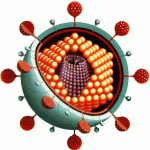Virology
|
22 july 2014 13:35:36 |
| Global temperature constraints on Aedes aegypti and Ae. albopictus persistence and competence for dengue virus transmission (Parasites & Vectors) |
|
Tweet Background:
Dengue is a disease that has undergone significant expansion over the past hundred years. Understanding what factors limit the distribution of transmission can be used to predict current and future limits to further dengue expansion. While not the only factor, temperature plays an important role in defining these limits. Previous attempts to analyse the effect of temperature on the geographic distribution of dengue have not considered its dynamic intra-annual and diurnal change and its cumulative effects on mosquito and virus populations.
Methods:
Here we expand an existing modelling framework with new temperature-based relationships to model an index proportional to the basic reproductive number of the dengue virus. This model framework is combined with high spatial and temporal resolution global temperature data to model the effects of temperature on Aedes aegypti and Ae. albopictus persistence and competence for dengue virus transmission.
Results:
Our model predicted areas where temperature is not expected to permit transmission and/or Aedes persistence throughout the year. By reanalysing existing experimental data our analysis indicates that Ae. albopictus, often considered a minor vector of dengue, has comparable rates of virus dissemination to its primary vector, Ae. aegypti, and when the longer lifespan of Ae. albopictus is considered its competence for dengue virus transmission far exceeds that of Ae. aegypti.
Conclusions:
These results can be used to analyse the effects of temperature and other contributing factors on the expansion of dengue or its Aedes vectors. Our finding that Ae. albopictus has a greater capacity for dengue transmission than Ae. aegypti is contrary to current explanations for the comparative rarity of dengue transmission in established Ae. albopictus populations. This suggests that the limited capacity of Ae. albopictus to transmit DENV is more dependent on its ecology than vector competence. The recommendations, which we explicitly outlined here, point to clear targets for entomological investigation. |
| 94 viewsCategory: Epidemiology, Microbiology, Virology |
 Wolbachia strain wAlbB confers both fitness costs and benefit on Anopheles stephensi (Parasites & Vectors) Wolbachia strain wAlbB confers both fitness costs and benefit on Anopheles stephensi (Parasites & Vectors)Exploratory space-time analysis of dengue incidence in trinidad: a retrospective study using travel hubs as dispersal points, 1998-2004 (Parasites & Vectors) 
|
| blog comments powered by Disqus |
MyJournals.org
The latest issues of all your favorite science journals on one page
The latest issues of all your favorite science journals on one page



